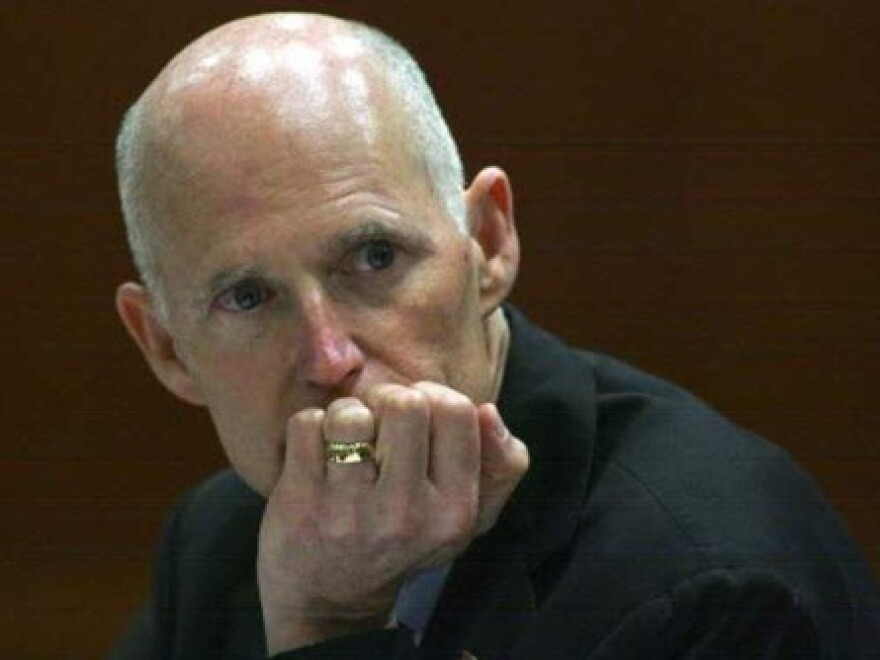Debby Dawson, who lives in southwest Florida, has a simple message to Gov. Rick Scott: The state's existing scholarship program for disabled children is "life changing" and has helped her 7-year-old autistic son "develop by leaps and bounds."
Dawson is part of a chorus of parents from around the state who have mounted a campaign through letters, emails and phone calls urging the Republican governor to sign a sweeping education bill that will soon come to his desk.
But that same bill has sparked an outpouring of an even larger negative reaction to Scott both directly and on social media.
School superintendents, the state's teacher union, parent-teacher groups and Democrats have called on the governor to veto the bill. Even Agriculture Commissioner Adam Putnam, the leading Republican candidate for governor in 2018, called the legislation a "train wreck" on Tuesday and said Scott should take a "hard look" at vetoing the bill.
That's because GOP legislators crafted the 300-page bill largely in secret, and included in it portions that would steer more state and local money to privately-run charter schools. The legislation (HB 7069) also mandates recess in elementary schools, expands virtual education courses to private and home schooled students, and tweaks Florida's testing system.
Scott, who supported the creation of the scholarship program, has not yet said what he plans to do.
But if he vetoes the bill, however, he will wipe out an extra $30 million for the Gardiner Scholarship program that provides tuition, therapy and other services to roughly 8,000 disabled students. Legislators included $73 million in the state budget for scholarships, but those who operate the program say it is growing and they may not have enough money to serve everyone without the extra money. Additionally legislators passed a separate bill that would expand those eligible for the program.
That's why Dawson wrote Scott asking him to sign the bill. She said without the extra money her other son — who is about to turn 3 years old — may not get a scholarship in the coming year.
"As a parent who has seen how life changing this grant is, and knowing my second child may not have the same opportunities as my oldest, it is heartbreaking to say the least," Dawson wrote in an email to a reporter. "This grant opens up doors for our children where the doors were once shut and locked tight."
Legislative leaders have not given a detailed explanation on why they put the extra money for the scholarship program in the bill, which was not released publicly until two days before a final vote. Initially, the state Senate had more than $100 million in its budget for the program, but then agreed to lower it during budget negotiations.
Sen. Jack Latvala, the budget chairman, said the decision to include the money in the bill and not the budget was at the urging of House Speaker Richard Corcoran. When asked Corcoran called it a "compromise" since the House did not include the higher amount in its initial budget.
Sen. Gary Farmer, a Fort Lauderdale Democrat opposed to the bill, argued that legislative leaders crafted the legislation this way in order to make it harder for Scott to veto the bill.
"I was deeply disturbed that (the families of disabled children) were hijacked and used as pawns to mollify opposition to an otherwise bad bill," Farmer said.
School choice advocates, including former Gov. Jeb Bush, are asking Scott to sign the bill. Former Senate President Andy Gardiner, who has a son with Down syndrome and helped create the program, said he hopes the "governor is mindful" that the bill isn't just about charter schools and that many families will be affected by his decision.
Barbara Beasley, whose 9-year-old daughter receives a Gardiner scholarship, says it has dramatically improved her daughter's life, but she said that "lawmakers sold us down the river with their backroom dealing on the education bill." She said other parts of the legislation are detrimental to public schools and should be stopped.
"I beg Gov. Scott to order lawmakers back to session to fix their mistakes, separate these items from the bad and push them through," Beasley said.

